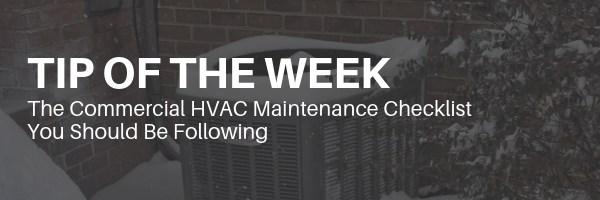As a commercial business owner, facility costs account for a large chunk of your spending each year. Besides rent or mortgage expenses, energy costs are considerable – U.S. commercial and industrial facilities spend $400 billion on energy alone each year!
Lowering your energy spending generates savings that can be better allocated to other causes, such as expanding your business and generating new income. Looking for a place to start saving? Begin with your commercial HVAC systems.
As a commercial business owner, facility costs account for a large chunk of spending each year. Besides rent or mortgage expenses, energy costs are considerable United States commercial industrial facilities spend $400 billion on energy alone each year. Lowering your energy spend generates savings that can be better allocated to other causes such as expanding business and generating new income. Looking for a place to start saving? begin with your commercial HVAC systems.
HVAC systems, along with lighting are the biggest energy consumers in the average commercial building. While there is certainly something to be said for building automation systems and other technology which work to reduce energy consumption maintaining your systems through commercial HVAC maintenance.
Importance of Commercial HVAC Maintenance
HVAC systems, along with lighting, are the biggest energy consumers in the average commercial building. While there’s certainly something to be said for building automation systems and other technology which work to reduce energy consumption, maintaining your systems through commercial HVAC maintenance greatly impacts the amount of energy this equipment uses. Our Commercial HVAC Maintenance Checklist will show you the steps which need to be followed to keep your building’s HVAC equipment in top shape, consuming less energy and serving you longer.
Facility managers and maintenance departments can keep commercial HVAC systems running more efficiently through regular commercial HVAC maintenance. Use this commercial HVAC maintenance checklist as a guide to follow.
Preventative Commercial HVAC Maintenance
Not all businesses require the same needs from their HVAC systems. Customized commercial HVAC maintenance plans may be offered by your preferred contractor, which will provide the specific care your system needs to boost performance.
- Performed in the spring for cooling systems, the fall for heating systems
- This is a service which should be performed by a commercial HVAC technician. Preventative maintenance serves as a tune-up for your building’s HVAC systems, helping them run more efficiently throughout the season. Several steps will be taken to correct existing issues and prevent future performance problems and breakdowns – these steps generally include the following.
- For outdoor components:
- Coil and cabinet are inspected and cleaned
- Drain pans and condensate lines are cleared of obstructions
- Compressor is inspected
- Fan motor and blades are inspected and lubricated
- Control box, switches, wiring, and safety controls are inspected
- Refrigerant level is measured and recharged if necessary
- For indoor components:
- Blower assembly is checked and cleaned
- Belts are lubricated or replaced
- Combustion blower housing is cleaned
- Evaporator coil, drip pan, and condensate lines are cleaned and cleared
- Burner assembly is inspected and cleaned
- Ignition system is cleaned
- Safety controls are tested
- Heat exchanger is inspected
- Flue system is checked for dislocations and wear
- Control box, wiring, and connections are checked and tightened
- Duct system is checked
- For outdoor components:
-
-
- Air filters should be inspected every three to four weeks to ensure the filter has not become clogged with debris.
- Changing of air filters should be performed every three to six months, per the manufacturer’s recommendation or as needed.
- Maintenance staff should stay on top of air filter checks and changes, as restricted airflow through the HVAC systems hinders performance and increases energy consumption by this equipment. During periods of heavy use, you may find it necessary to replace filters more frequently.
- Running your commercial HVAC systems with clean air filters can lower energy consumption by up to 15%.
- Before scientists could prove the air in our homes could adversely impact our health, Aprilaire introduced hundreds of products to promote healthier living by improving the quality of the air we breathe. Aprilaire continues to be the market leader in residential whole-home humidification and Indoor Air Quality products, we offer an extensive portfolio of solutions that create healthy air in your home to help you feel better, sleep better and live better.
-
-
-
- Perform at the beginning of heating season and cooling season, and when temperatures hit the point of not using the systems regularly.
- When it’s time to switch from one HVAC system to the next, or it’s time to not run it so frequently, it’s time to check the programming on your building’s thermostats to ensure settings are optimal for energy savings. Do this by manually programming your thermostats or through your building automation system; even if you’ve programmed heating and cooling schedules in the past, it’s still smart to recheck to make sure they still fit your needs and the same areas are still in regular use.
- When it is time to switch from one HVAC system to the next, or it is time to not run it so frequently.
-
-
-
- Perform these monthly, or as needed.
- Check thermostat operation. If your thermostats are not operating correctly throughout the season, your HVAC systems could be running more frequently than necessary, boosting your energy consumption. If thermostats are not working properly, have them repaired or replaced.
- Check drip pan and drain lines. Clogs in your HVAC systems’ drainage lines can cause moisture to back up into your building, causing mold and mildew growth as well as the potential for damage. Make sure the drip pan and drain lines are emptying correctly and remove any obstructions that develop.
-

0 Comments Leave a comment